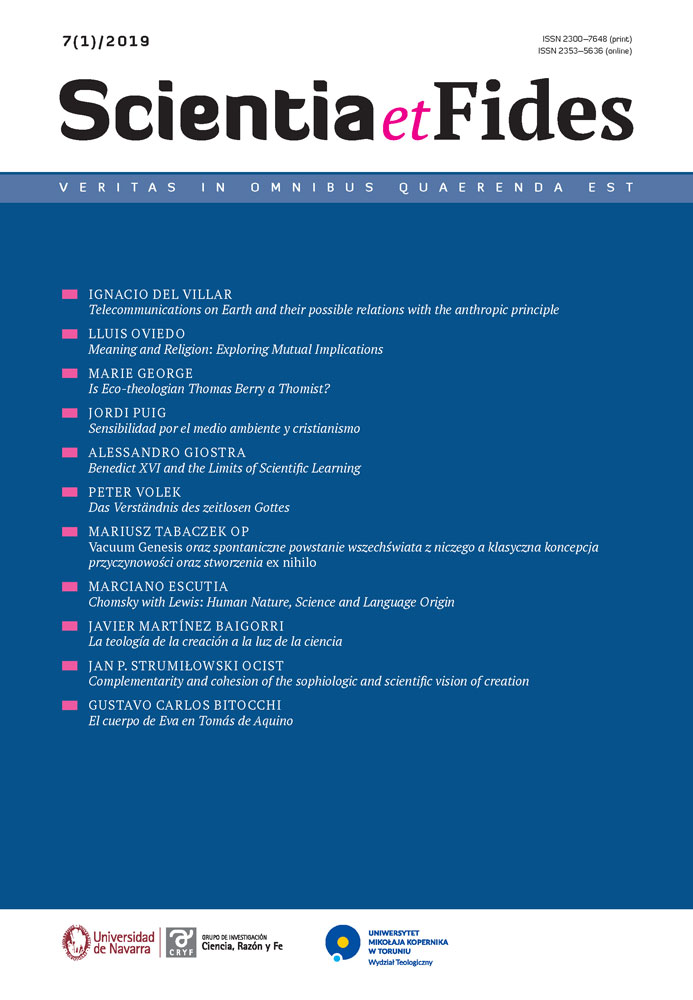Meaning and Religion: Exploring Mutual Implications
Keywords
purpose, hermeneutics, systems theory, religious coping, information theoryAbstract
“Meaning” and “religion” appear as deeply interlinked concepts in modern thought. Theology has often discovered religious faith as a “source of meaning” against a background of “meaninglessness”, as the XX century existentialist philosophies would remark. Beyond such an apologetic stance, some philosophies of religion have tried to better describe such a link: hermeneutics, phenomenology and even systems theory, may be accounted as main attempts to tackle this very complex framework, and to show how religion provides meaning, or is built trough structures of meaning, or is a form of “meaning-construction”. Cognitive approach may add new perspectives to better explain this implication. Recent attempts combine scientific methods and philosophical analysis to show how meaning is built and works, and how religion provides a specific sort of meaning, distinct from other forms in which meaning displays itself: moral, aesthetic, or affective. Describing religion in terms of “meaning management” helps to better understand its specific role and function in the human mind, beyond the most reductivist programs, and offers a more balanced view on its cognitive dimensions. Different attempts to connect religion and meaning are reviewed in this paper in order to offer an alternative model to the new scientific study of religion.
References
Atran, Scott. 2002. In Gods We Trust. New York, Oxford: Oxford University Press.
Baumeister, Roy F. 1991. Meanings of life. New York: Guilford.
Bourdieu, Pierre. 1994. Raisons pratiques. Sur la théorie de l’action. Paris: Seuil.
Boyer, Pascal. 2001. Religion Explained: The Evolutionary Origins of Religious Thought. New York: Basic Books.
Carruthers, Peter and Andrew Chamberlain. 2000. Evolution and the Human Mind: Modularity, Language and Meta-Cognition. Cambridge, New York: Cambridge University Press.
De Caro, Mario and David Macarthur (eds.). 2004. Naturalism in Question. Cambridge MA - London U.K.: Harvard University Press.
Donald, Merlin. 1991. Origins of the Modern Mind. Harvard, MA, London U.K.: Harvard University Press.
Donald, Merlin. 2001. A Mind so Rare: The Evolution of Human Consciousness. New York, London: W.W. Norton & Co.
Eagleton, Terry. 2007. The Meaning of Life. Oxford - New York: Oxford University Press.
Elias, Norbert. 1994. The Civilizing Process. Oxford: Basil Blackwell.
Flanagan, Owen, The Really Hard Problem: Meaning in a Material World, Cambridge, MA, London U.K.: MIT Press, 2008.
Fodor, Jerry 1983. The Modularity of Mind. Cambridge, MA.: MIT Press.
Fodor, Jerry. 2000. The Mind Doesn’t Work That Way: The Scope and Limits of Computational Psychology. Cambridge, MA.: MIT Press.
Gasser, Georg (ed.). 2007. How Successful is Naturalism? Frankfurt a.M. - Paris: Ontos Verlag.
Hicks, Joshua A. and Clay Routledge (Eds.). 2013. The Experience of Meaning in Life: Classical Perspectives, Emerging Themes, and Controversies. Dordrecht, Heidelberg and New York: Springer.
Horst, Steven. 2007. Beyond Reduction: Philosophy of Mind and Post-Reductionist Philosophy of Science, Oxford - New York: Oxford University Press.
Horwich, Paul. 1998. Meaning. Oxford - New York: Oxford University Press.
Lee, Lois. 2015. Recognizing the non-religious. Oxford, New York: Oxford University Press.
Luhmann, Niklas. 1977. Funktion der Religion, Frankfurt a.M.: Suhrkamp.
Luhmann, Niklas. 1985. “Society, Meaning, Religion- Based on Self-Reference.” Sociological Analysis 46: 5-20.
Luhmann, Niklas. 1989. Gesellschaftsstruktur und Semantik: Studien zur Wissenssoziologie del modernen Gesellschaft, 3. Frankfurt a.M.: Suhrkamp.
Luhmann, Niklas. 2000. Die Religion der Gesellschaft. Frankfurt a.M.: Suhrkamp.
McCullough, Michel E. and Brian L.B. Willoughby. 2009. “Religion, Self-Regulation, and Self-Control: Associations, Explanations, and Implications.” Psychological Bulletin 135-1: 69-93.
Neuman, Yair. 2006. “A Theory of Meaning.” Information Sciences 176: 1435-1449.
Newton, Taylor and Daniel McIntosh. 2013. “Unique Contributions of Religion to Meaning”, in Hicks, Joshua A. and Clay Routledge (Eds.), The Experience of Meaning in Life: Classical Perspectives, Emerging Themes, and Controversies, Dordrecht, Heidelberg and New York: Springer, 257-270.
North, Douglass. 2005. Understanding the Process of Economic Change. Princeton, N.J.: Princeton University Press.
Paloutzian, Raymond F. 2017. “Psychology of Religion in the World.” Pistis Praxis 9-1:15-30.
Park, Crystal L. 2010. “Making Sense of the Meaning Literature: An Integrative Review of Meaning Making and Its Effects on Adjustment to Stressful Life Events.” Psychological Bulletin 136: 257-301.
Park, Crystal L. 2013. “The Meaning Making Model: A framework for understanding meaning, spirituality and stress-related growth in health psychology.” The European Health Psychologist 15-2: 40-47.
Routledge, Clay. 2018. Supernatural: Death, Meaning, and the Power of the Invisible World. New York: Oxford University Press.
Shore, Bradd. 1996. Culture in Mind: Cognition, Culture, and the Problem of Meaning. Oxford - New York: Oxford University Press.
Spaemann, Robert. 1994. „Funktionale Religionsbegründung und Religion“ in Philosophische Essays. Ditzingen: Reclam.
Steiner, George. 1989. Real Presences. Chicago: University of Chicago Press.
Zuckerman, Phil, Luke W. Galen, Frank L. Pasquale. 2016. The Nonreligious: Understanding secular people & societies. Oxford, New York: Oxford University Press.
Downloads
Published
How to Cite
Issue
Section
License
CC BY ND 4.0. The Creator/Contributor is the Licensor, who grants the Licensee a non-exclusive license to use the Work on the fields indicated in the License Agreement.
- The Licensor grants the Licensee a non-exclusive license to use the Work/related rights item specified in § 1 within the following fields: a) recording of Work/related rights item; b) reproduction (multiplication) of Work/related rights item in print and digital technology (e-book, audiobook); c) placing the copies of the multiplied Work/related rights item on the market; d) entering the Work/related rights item to computer memory; e) distribution of the work in electronic version in the open access form on the basis of Creative Commons license (CC BY-ND 3.0) via the digital platform of the Nicolaus Copernicus University Press and file repository of the Nicolaus Copernicus University.
- Usage of the recorded Work by the Licensee within the above fields is not restricted by time, numbers or territory.
- The Licensor grants the license for the Work/related rights item to the Licensee free of charge and for an unspecified period of time.
FULL TEXT License Agreement
Stats
Number of views and downloads: 938
Number of citations: 10



